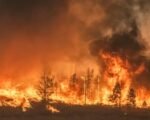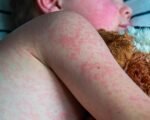GRAND JUNCTION, Colo. — Colorado health authorities have confirmed two additional measles cases, bringing the state’s 2025 total to three. Health officials say the cases appear unrelated, raising fresh concerns about the state’s vulnerability to sporadic and unlinked outbreaks of a highly contagious — yet preventable — disease.
The Denver Department of Public Health & Environment (DDPHE) confirmed its first measles case of the year in an infant who had recently traveled to Mexico, where measles outbreaks remain ongoing. The child was too young to receive the routine measles-mumps-rubella (MMR) vaccine, typically administered around 12 months of age.
“This underscores the risk of international travel for unvaccinated individuals,” DDPHE said in a statement. “Even brief exposure in outbreak areas can lead to infection.”
Meanwhile, the Archuleta County Public Health Department (ACPHD) confirmed a third case — this time in an adult of unknown vaccination status. The department has not released details about the individual’s condition or travel history but confirmed there is no known link between the Archuleta case and the others in Denver or Pueblo.
Unlinked Cases Trigger Broader Surveillance
The earlier 2025 measles case, reported in Pueblo County, has also not been epidemiologically connected to either of the new infections. The lack of linkage among the three cases suggests separate sources of exposure and raises red flags for public health surveillance efforts.
Officials say investigations are ongoing to track potential exposure sites, and contact tracing efforts are underway to identify individuals who may have been in proximity to infected persons.
“Measles is incredibly contagious — far more than COVID-19 or influenza,” said a spokesperson for Colorado’s Department of Public Health and Environment (CDPHE). “It can linger in the air for up to two hours after an infected person has left the area.”

The Measles Threat: Preventable But Persistent
Measles is caused by a virus that spreads via respiratory droplets — coughing, sneezing, or even breathing in close quarters. Symptoms typically begin 7 to 14 days after exposure and include high fever, cough, runny nose, and a telltale rash that spreads over the body. In severe cases, it can lead to pneumonia, encephalitis, or death.
While the disease was declared eliminated in the United States in 2000, vaccine hesitancy, gaps in immunization, and international travel have fueled a resurgence in recent years.
The MMR vaccine, given in two doses (first at 12-15 months, second at 4-6 years), is approximately 97% effective in preventing measles. However, infants too young to be vaccinated and immunocompromised individuals remain highly vulnerable — depending on herd immunity levels in their communities to remain safe.
CDC Warning: Rising National Risk
The U.S. Centers for Disease Control and Prevention (CDC) has reported a nationwide uptick in measles cases in early 2025, linked in many cases to international travel and communities with low vaccination coverage.
In a March health alert, the CDC urged providers to remain vigilant and report suspected cases quickly, emphasizing that “early detection and rapid isolation remain our best defense in preventing wider community spread.”
Public Health Response in Colorado
So far, Colorado’s response has centered on isolation of confirmed cases, notifying potentially exposed individuals, and reinforcing vaccine messaging.
DDPHE and ACPHD are advising unvaccinated individuals — particularly adults unsure of their vaccine status — to consult their healthcare provider. Those planning international travel are strongly urged to ensure they are up-to-date on the MMR vaccine, especially when visiting regions with known outbreaks, including parts of Latin America, Africa, and Eastern Europe.
What to Watch:
-
Contact Tracing: Officials in Denver, Pueblo, and Archuleta continue working to identify others exposed.
-
Potential Community Exposure Notices: Health departments may release public exposure site warnings if risk is identified.
-
Vaccine Uptake Trends: Any rise in MMR vaccine administration in response to these cases may be a positive public health signal.
As of now, there is no indication of widespread community transmission in Colorado — but with three unrelated cases in separate counties, public health officials are not taking any chances.














